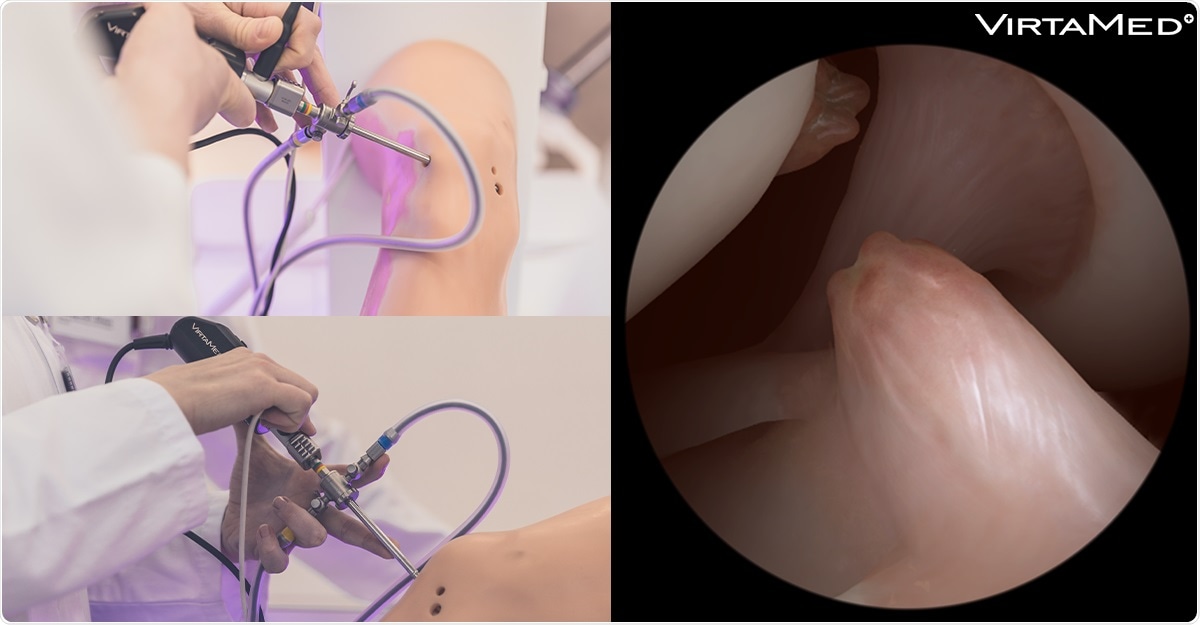Independent surgical simulation training becomes the new normal for students at the Pan Am Clinic.

Image Credit: VirtaMed
Surgical resident training has traditionally occurred in a master–apprentice-type relationship, with graduated responsibilities until the trainees are expected to perform procedures on their own. Given recent changes in the health care system, including reduced operating room time, increased difficulty of procedures and working hour restrictions, there is less time for residents to learn using the traditional method.
Researchers from the University of Manitoba and the Pan Am Clinic recently published a paper in the journal Arthroscopy, Sports Medicine, and Rehabilitation that looked at the effectiveness of a mixed reality simulator for the training of arthroscopy novices. Following this study, the residency program has made it a requirement in the curriculum that residents in their sports rotation complete the self-learning modules.
Dr. Samuel Larrivée, one of the study’s authors, stated that:
Sports surgeons at our institution noted anecdotally that junior residents had difficulty reaching competency in arthroscopic skills by the end of their three-month rotation, and were not as prepared when starting their senior rotation. There was a need to increase training opportunities outside of the operating room in order to prepare our residents for independent practice.”
Prior to obtaining the ArthroS™ simulator, the University of Manitoba Orthopedic Surgery program occasionally used simulation such as benchtop dry simulators, cadavers and an older generation simulator with active haptics. These were mostly used to complement academic teaching sessions in small groups with some success, and available for use by residents as needed. However, due to the low fidelity and difficult setup, few residents took up the opportunity.
Medical student engagement with the ArthroS simulator was different. Alisha Beaudoin, a co-author and medical student, attested to her experience using the ArthroS simulator in her early training. “I found this training to be very helpful during my surgery rotation. Many of my preceptors were impressed by my superior arthroscopic and laparoscopic skills. This training may allow students with an interest in surgery to be more prepared.”
Recently, many Canadian universities have moved to competency-based curriculums where residents must demonstrate competency prior to moving to the next defined practice level. The study noted that this is similar to the training available on VirtaMed ArthroS and that “a user enrolled in the mentoring program is progressed through various levels of training by meeting training targets, essentially providing a proficiency-based progression.”
This paper is the first in what the authors hope is a larger body of work on validating arthroscopy simulators for resident training. There are currently plans to repeat similar studies with the other modules (hip, shoulder, and ankle), with larger sample sizes, and at different levels of training.
The Study
Study participants were divided into three groups: simulator training only, mentor-based training, and a control. At the end of four weeks, surgical performance improved among both traditional and simulator-based training groups. The study concluded that “simulator training may provide enhanced skills to improve patient safety overall, as residents may become more skilled earlier in their training, leaving more time for the mentor to teach more advanced skills.” Beaudoin further explains: “I believe that simulation training should be introduced into the standardized curriculum because I believe it offers a safe space to hone your skills and improve in a stress-free environment.”
Based on the study results, residents are now required to complete the self-learning modules as part of training during their sports rotation. Certain modules have been identified at the junior and senior levels. Dr. Larrivée believes this will allow residents to develop their triangulation skills and memorize the steps prior to their first surgery and consolidate their knowledge.
Read more
About Pan Am Clinic
The Pan Am Clinic is a publicly funded organisation based in Winnipeg, Canada that offers a complete range of musculoskeletal care. In addition to sport medicine physicians, orthopedic surgeons, physiotherapy and day surgery services, the Clinic is affiliated with the University of Manitoba for the training of medical students, and orthopaedic surgery residents and fellows. It is also supported by the Pan Am Clinic Foundation, which helps raise funds for the Clinic’s renowned research, education, and health care programs. A generous donation to the Foundation allowed the clinic to acquire the VirtaMed ArthroS simulator for research and surgical training.
About VirtaMed
VirtaMed believes medical education is powerfully delivered through data-driven simulation solutions. Since 2007, we have developed the leading solutions for training outside the operating room because we believe healthcare professionals should never have to perform a procedure for the first time on a patient. VirtaMed’s simulators provide the most realistic and cost-effective training available for orthopedic surgeons.
VirtaMed ArthroS is the most advanced mixed reality training simulator for diagnostic and therapeutic knee, shoulder, hip, and ankle arthroscopy. Together with AANA, AAOS, and ABOS, VirtaMed combined their virtual reality graphics with the Sawbones FAST module for Fundamentals of Arthroscopy Surgery Training. From ACL reconstruction to rotator cuff repair, VirtaMed ArthroS offers increasingly complex simulated patients and pathologies, incorporating advanced imaging techniques such as virtual fluoroscopy.